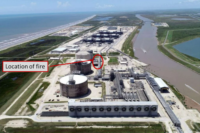Energy
Senate Hearing Debates Federal Pause on US LNG Export Site Approvals

The Port Arthur LNG export facility in Texas, seen here in rendering, is under Phase 1 construction with approved permits. Sempra Infrastructure is ENR Texas & Louisiana Owner of the Year.
Image courtesy Sempra Infrastructure
A top Biden administration official pushed back against congressional criticism of a presidential decision to temporarily pause government approvals of liquid natural gas export facilities while it evaluates economic and environmental effects of exports, including potential upward pressure on fuel prices for U.S. consumers and manufacturers.
David Turk, deputy secretary of the U.S. Energy Dept, which decides export approvals, told the Senate Energy and Natural Resources Committee that the amount of natural gas being shipped from the country, has risen dramatically since 2018 and the pause will give the agency time to evaluate how increases affect market issues including the public interest. He said the U.S. Energy Information Administration forecasts that high LNG exports would cause U.S. gas prices to rise 13% by 2050.
The export approval pause was implemented Jan. 26 and affects four proposed projects that are pending DOE's OK to ship LNG to foreign markets in Europe and elsewhere. It does not affect Federal Energy Regulatory Commission approvals of project siting and construction.
The U.S. has tripled its LNG export capacity in just five years, making it the world’s largest exporter at 14 billion cubic ft per day, but proposed export capacity has expanded since the war in Ukraine pushed Russia to curtail its LNG supply. Capacity is expected to nearly double again by 2030 with facilities now “authorized and under active construction,” Turk said, projecting about 26 billion cu ft per day being exported by the end of the decade.
DOE's temporary pause to update its analysis. which he characterized as "months," does not interfere with current exports or projects already now approved or being built. It also does not affect U.S. ability to supply its allies, and it is "not an unprecedented step,” he told the committee. The agency has a long history of reviewing proposed exports related to market, economic, national security and environmental factors, including impact of greenhouse gas emissions on nearby communities, Turk said.
“Congress through the Natural Gas Act has given DOE the responsibility to evaluate whether authorizations for the export of LNG to countries without free trade agreements is consistent with the public interest,” Turk said.
Committee Chair Joe Manchin, (D-W.Va.) criticized the agency decision to pause export approvals before its new market assessment is completed. “The White House has gone out of its way to signal that the pause is a political ploy intended to get votes in an election year—it’s all about politics, not economics and not based in facts,” he said. That assessment was echoed by ranking committee Republican John Barrasso, (Wyo.).
"While 17 LNG projects are theoretically affected by this pause, only four—Venture Global’s Calcasieu Pass 2 (CP2), Delfin LNG, Lake Charles LNG and Commonwealth LNG—are of note given how far they have progressed commercially," said Ira Joseph, senior research associate at the Center on Global Energy Policy at Columbia University. The DOE pause "does not pause the development of the projects. Nothing is stopping these LNG projects from continuing to sign contracts with buyers."
Partisan Lightning Rod
Attorneys general of 23 states raised objections to the pause in a letter to President Joe Biden and Energy Secretary Jennifer Granholm. “Instead of addressing American’s real energy challenges, your administration has decided to double down on a reckless environmental agenda through this Tik-Tok-inspired pause,” the states said, stating that the pause was implemented without clear congressional authorization.
States signing the letter include Texas, Louisiana, Oklahoma, West Virginia and others led by Republican administrations.
I In a letter to Congressional leaders and members, 65 climate and environmental advocacy groups urged them not to enact any measures that would expand LNG exports. In a statement, the White House said it "strongly opposes" the Pfluger bill but did not indicate if President Joe Biden would veto it.
James Watson, secretary general of Eurogas, an association of 101 European companies that advocate for climate neutrality, raised concern over whether the pause will affect the agreement between the U.S. and the European Commission to supply an additional 50 million cu meters per year of LNG by 2030.
Qatar is the only other source that can provide volumes that Europe needs to become independent of Russian LNG, he said.
But Europe will have sufficient gas supply for the "short to medium term," estimated as the next 10 years, despite the pause, a commission spokesperson said, with a longer term decline in its fossil fuel consumption.





